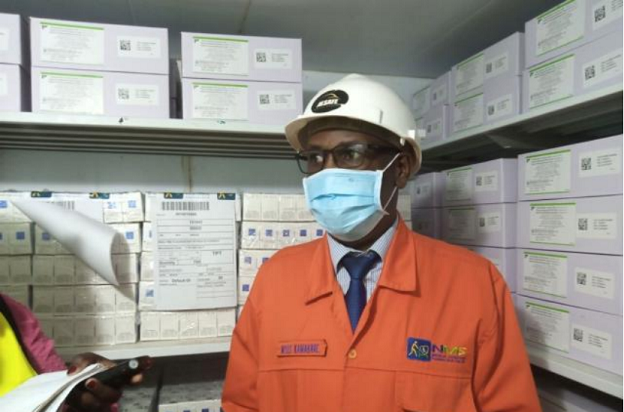NMS General Manager, Moses Kamabare.
With a blaring distress signal on and the blue top lights flashing, an ambulance rushed out of the gate at breakneck speed, leaving everyone at the health facility wondering what emergency had come up.
No sooner had it joined the main road though than the siren went off and it turned out barely a few minutes later that the ambulance had been intercepted by Police, recovering a box containing 2,000 pieces of dexamethasone injectable drug under batch number 10313 from the suspects aboard.
Guised as emergency cases being rushed from health facilities to the main hospitals, such thefts have in the past been rampant making it hard to curb the loss of government medicines and masterminded by health workers.
With the last mile delivery system being implemented by National Medical Stores, it is anticipated such diversion of government drugs and other medical supplies will be brought to a stop soon.
“The last mile delivery of commodities is meant to ensure essential medicines and medical supplies are delivered right to the door of the health facilities and the in-charge confirms receipt,” says NMS General Manager, Moses Kamabare.
“It is one of the methods we are employing to counter theft of government medicines,” he adds.
Close to a decade ago, it had been tedious to place orders for medicines and medical supplies to public health facilities. It had also been hectic having dispatches delivered on time, taking nearly three months.
At the time, the government lost a lot of money in the theft of drugs and other supplies and it necessitated authorities coming up with a robust system to curb diversion of medicines to private facilities.
The task to undertake these measures, though inherent in the Health Ministry, has had to fall squarely on the shoulders of National Medical Stores, gradually giving birth to the many ideas that eventually have resulted in the distribution monitoring tools.
“The supply chain currently undertaken by NMS has greatly improved and is well managed. Previously it would take months to get the supplies but there are less complaints now,” District Health Officer Kasese, Dr. Yusuf Baseka said.
Last mile tracking gives clients the visibility and sense of control that they expect over deliveries and any businesses that deliver goods and services directly to end users benefit from such a system.
“Everybody picking medicine from a public health facility in any part of the country must now be captured on real time,” Permanent Secretary Ministry of Health, Dr. Diana Atwine says, urging National Medical Stores to take lead in ensuring last mile delivery works.
How it works
National Medical Stores contracts private transporters to deliver the medicines from respective district headquarters to individual lover health facilities.
Personnel in charge of the facilities then receive cartons of supplies delivered, accompanied by delivery notes specifying quantities in each of the cartons in presence of local leaders in the area before opening of the consignments.
“The purpose of this is to ensure that what has been delivered confirms with what is indicated in the delivery notes and in good condition,” said one of the delivery clerks, asking not to be disclosed because he is not permitted to comment on such matters.





